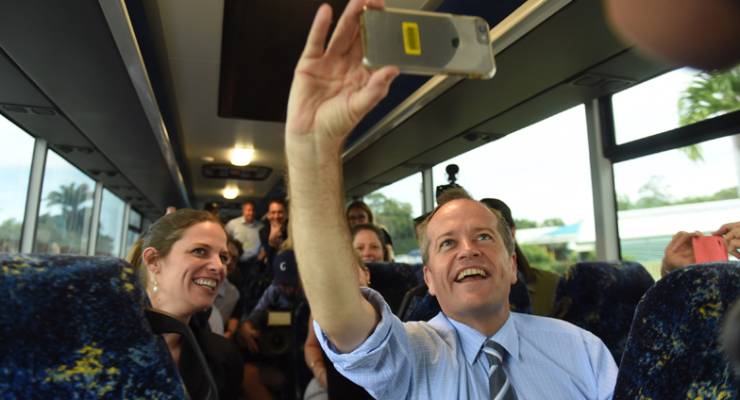
You can’t put senior reporters on the campaign bus because the close quarters mean they can’t break stories there, the Herald Sun‘s federal political editor Ellen Whinnett said at the University of Melbourne on Wednesday night.
Speaking on a heavy-hitting panel that included Tony Abbott’s former chief of staff Peta Credlin, Julia Gillard’s former chief of staff Ben Hubbard, journalist and former political staffer Barrie Cassidy and media academic Andrea Carson, and moderated by former top Labor staffer Nicholas Reece, Whinnett said News Corp always had two reporters on each bus. “[But] we don’t have bureau chiefs or political editors on the bus. There’s sometimes 40 people there — you can’t have a conversation on the phone without other people hearing.”
The usefulness of reporting on the campaign bus as a method of informing the public about the campaign was savagely ridiculed by then-blogger Greg Jericho in 2010, and has, since then, attracted no small amount of hand-wringing. Fairfax temporarily pulled its reporters off the bus during this campaign. But many of those on the buses defend the importance of being on the ground with the leaders day by day. Casual encounters and gaffes are recorded by the travelling press pack, who also ask the questions that can help shape the tone of the reporting around the country.
Speaking on the panel, Cassidy said the buses were useful — to a point. “When you’re part of that circus, you lose a lot of time. The most sensible approach for senior journalists is to get the transcripts and make the phone calls to get the exclusives … but go out a little to get a feel for it.”
In the 1980s, when he was a political staffer, Cassidy said the media would be told the locations where the leaders would be going to for the whole week. “If you made a change, it would be a big deal,” he said, leading “quite rightly” to analysis of why things had changed. “We gave the media a lot of information. It was a good thing, but it disadvantaged politicians.”
“Now I think control is excessive. You get into a bus not knowing where you’re going, or an airport not knowing what city you’re going to.
“And at the doorstops — Turnbull is adept at this — he takes five questions. There’s no follow-ups. He gets asked about the plebiscite and asks whether anyone has a question on the economy. He never goes back to the plebiscite. So you can control things very efficiently.”
It’s not that the campaigns don’t plan the leader journeys ahead; Hubbard used to map out everything, Reece said. Asked how he did it, Hubbard responded that while the grid should be well-structured, it’s important to maintain flexibility.
“The challenge is to have something to say,” Hubbard said. “You have to do the policy work as well — not just the mechanics. You have to have … things you can bring off the shelf. You can’t just go out there and make stuff up.”
Peta Credlin said few people realised how the travelling campaign was a drain on the offices of the leaders. Each political office of 40-odd staff is responsible for the logistics of the leader and his or her party — which can be 40 people — and anywhere between 30 to 80 members of a travelling press pack. “You have to physically move their bags, organise their buses, hotel rooms.
“We had one night in 2013 where we slept in the same bed two nights in a row. Otherwise, you’re doing logistics without letting anyone know where you’re going — so they don’t analyse it.
“That logistics isn’t done by anyone outside the political staff. So you lose brain power from your team to do it. But it’s the only way you can do it.”
It’s a drain on the leaders too, she says, who’ll stay closely plugged into whatever’s happening at campaign headquarters. This can mean they’re in one city but are calling in to do radio interviews on the other side of the country, because CHQ reckons they need to shore up the vote there. Then the leaders will often stay up to midnight covering off on the next day’s policy announcements. “The leaders I’ve worked with want to physically go through the documents,” she said. It’s a gruelling couple of weeks — or as is the case this year, months.








Crikey is committed to hosting lively discussions. Help us keep the conversation useful, interesting and welcoming. We aim to publish comments quickly in the interest of promoting robust conversation, but we’re a small team and we deploy filters to protect against legal risk. Occasionally your comment may be held up while we review, but we’re working as fast as we can to keep the conversation rolling.
The Crikey comment section is members-only content. Please subscribe to leave a comment.
The Crikey comment section is members-only content. Please login to leave a comment.